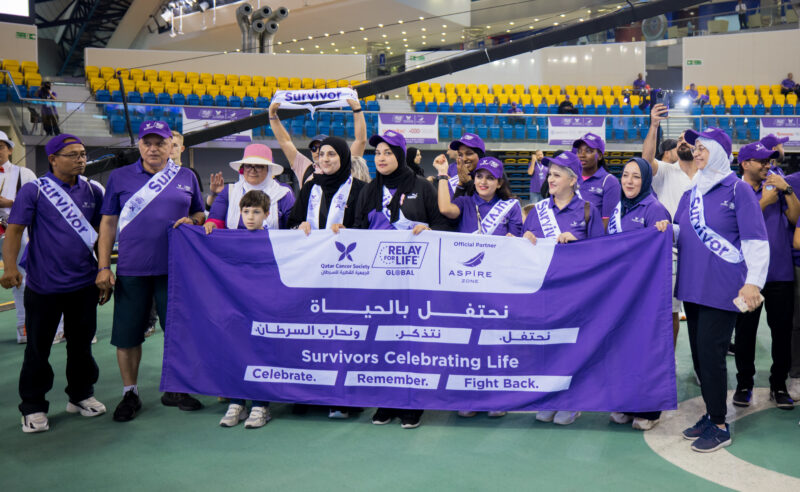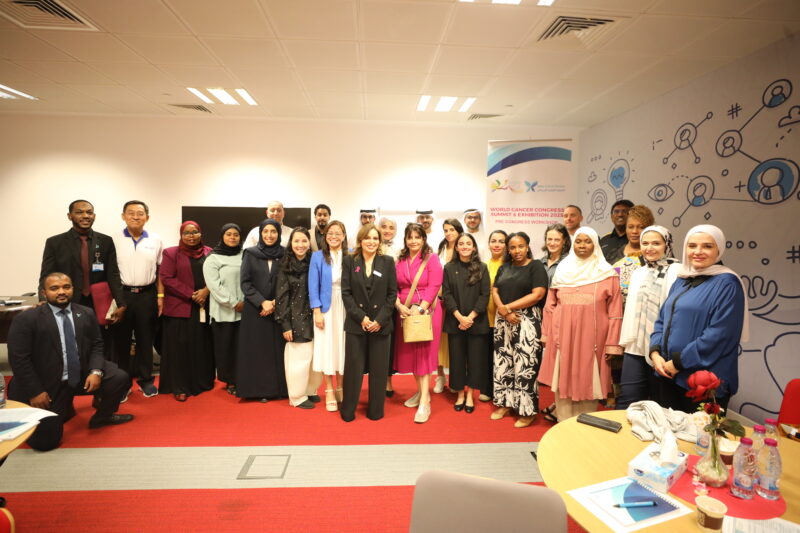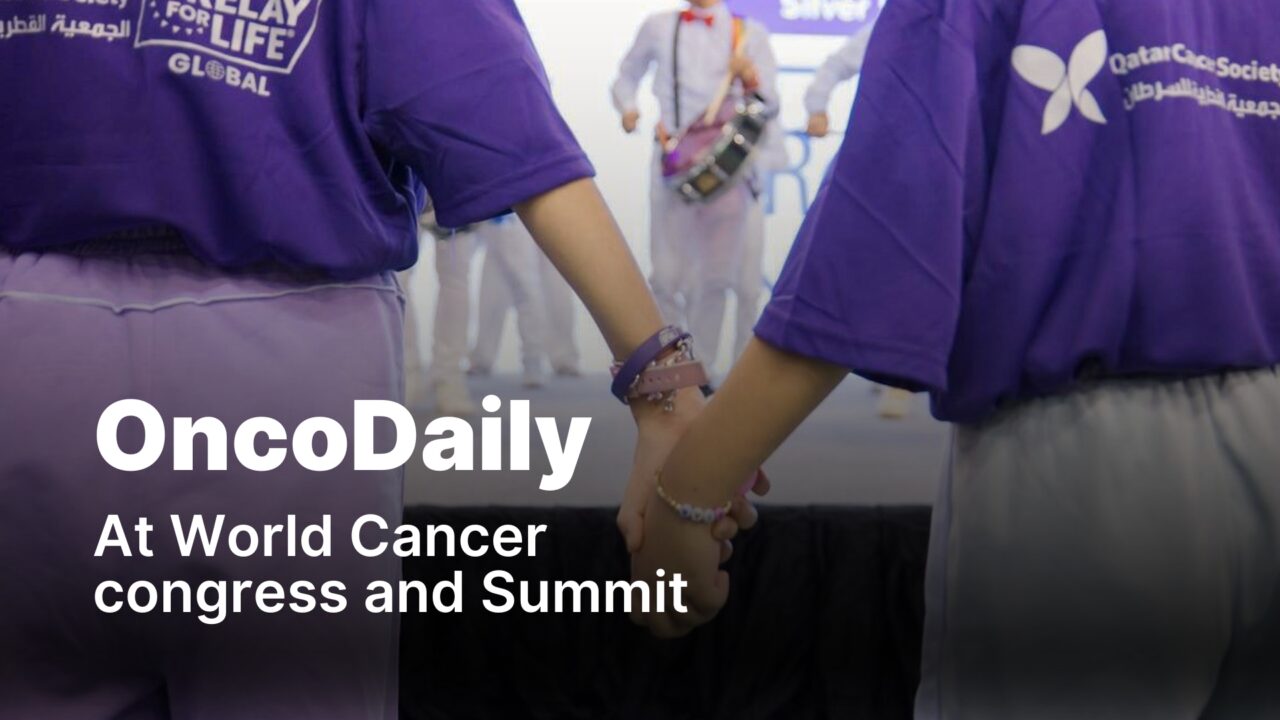Under the banner of global unity and shared purpose, the World Cancer Congress Summit and Exhibition 2025 and “NGO Lab” pre-congress Workshop unfolded as a remarkable cross-border collaboration — beginning in Qatar and culminating in Oman. This year’s congress brought together experts, advocates, policymakers, and survivors from around the world, all committed to advancing the global cancer agenda.
Far beyond a scientific meeting, the journey became a celebration of resilience, partnership, and 25 years of dedication by the Oman Cancer Association (OCA) — a leading voice in regional cancer awareness and prevention — held in collaboration with the Qatar Cancer Society, which hosted the pre-congress NGO Lab workshop in Doha as a key partner in this cross-border initiative.
A Meaningful Start in Qatar: Relay for Life
The week-long journey opened in Doha with the Relay for Life, a deeply symbolic and moving indoor event that brought together survivors, caregivers, and supporters in a shared space of hope and remembrance. Rather than a traditional outdoor walk, the event emphasized storytelling and community participation.

Source: Qatar Cancer Society
Cancer survivors took the stage to share their journeys — stories of strength, uncertainty, and triumph — each echoing the resilience of the human spirit. Musical performances and artistic expressions added warmth to the evening, creating an atmosphere that blended empathy with empowerment.
The Relay for Life, organized in partnership with global advocacy networks, reminded participants that the fight against cancer extends far beyond hospitals and laboratories. It begins in the heart of every community, through awareness, early detection, and the courage of individuals who refuse to give up.
The NGO Lab: A Platform for Collaboration
Building on that emotional beginning, the following two days in Qatar were devoted to the NGO Lab pre-congress workshop, which became a vibrant hub of dialogue and innovation. Hosted with the participation of civil society organizations, advocacy groups, and international health leaders, the workshop aimed to strengthen global and regional partnerships in cancer control.
The NGO Lab encouraged open exchange and co-creation of strategies to address some of the most urgent challenges in cancer care — from raising public awareness to expanding early detection and bridging gaps in access to treatment. Through interactive sessions and collaborative case studies, participants developed new approaches to mobilizing communities, enhancing health literacy, and leveraging technology to support patients.
Particularly noteworthy were discussions on integrating cancer prevention into national health agendas, empowering survivors as advocates, and addressing the unique challenges faced by low- and middle-income countries. The workshop’s inclusive design ensured that every voice — from grassroots organizations to established institutions — was heard.

Source: Qatar Cancer Society
The energy and insights cultivated in Doha laid a strong foundation for what awaited in Oman — the formal opening of the World Cancer Congress Summit and Exhibition.
Muscat: A Congress and a Celebration
The congress officially opened in Muscat, Oman, marking not just an international gathering of oncology leaders but also the 25th anniversary of the Oman Cancer Association (OCA). Founded in 2000, OCA has evolved into one of the most influential health organizations in the region, spearheading national efforts in cancer awareness, screening, and patient support.
The milestone anniversary was celebrated throughout the congress, honoring a quarter century of advocacy, education, and unwavering service to the Omani community. Exhibits and sessions highlighted OCA’s achievements — from launching nationwide breast cancer screening campaigns and mobile mammography units to leading awareness drives in schools and workplaces.
The congress program in Muscat was rich and multidisciplinary, featuring panel discussions, keynote addresses, and interactive exhibitions covering every dimension of cancer care. Topics ranged from advances in early diagnosis and precision medicine to the psychosocial aspects of survivorship and the importance of equitable healthcare access across regions.
What set this congress apart was its emphasis on human connection. Policymakers, clinicians, and advocates engaged in honest dialogue about challenges and progress, seeking collaborative pathways rather than isolated solutions. In the exhibition hall, visitors could explore the latest diagnostic technologies, data-driven platforms, and innovative public health tools, each designed to enhance early detection and patient outcomes.
The atmosphere in Muscat was one of pride, gratitude, and optimism — pride in how far cancer advocacy has come, gratitude for the global partnerships that make it possible, and optimism for what lies ahead.
A Fitting Finale: The Walkathon in Oman
The week concluded with a Walkathon in Muscat, an event that symbolized movement — both literal and metaphorical — toward a healthier, cancer-aware future. Participants from all walks of life joined together, wearing shirts and ribbons in solidarity.
Families, healthcare workers, and students walked side by side, their collective steps serving as a reminder that awareness is not confined to conference halls or policy meetings. It lives in the everyday actions of people who choose to be informed, to get screened, and to stand together in support of prevention.
The walkathon perfectly captured the essence of the entire journey — unity, empowerment, and the shared determination to create lasting change.
A Journey of Hope and Progress
From the heartfelt Relay for Life and thought-provoking NGO Lab in Qatar to the celebratory World Cancer Congress and Walkathon in Oman, this cross-border initiative showcased what global cancer collaboration truly means.
It was a week that connected stories and science, policy and people, innovation and empathy. It demonstrated that progress against cancer is not achieved through isolated achievements, but through collective action — through partnerships that cross borders, through communities that care, and through organizations like the Oman Cancer Association and Qatar Cancer Society which continue to lead with vision and compassion.
As the congress came to a close, one message resonated across all participants: the fight against cancer is not defined by boundaries but by unity — and together, the world can move closer to a future where cancer is not feared, but faced with hope.


